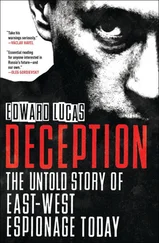Edward Lucas
THE SNOWDEN OPERATION
Inside the West’s Greatest Intelligence Disaster
Glossary/Dramatis Personae
Jacob Appelbaum — Hacker, cyber-libertarian, cryptography expert. Now living in Berlin.
Glenn Greenwald — Blogger and journalist, former trial lawyer. Fierce critic of American corporate and government wrongdoing. Now lives in Brazil.
Laura Poitras — Heiress, former chef, award-winning filmmaker. Now living in Berlin.
Edward Snowden — Former contractor for the NSA, who took up to 1.7m secret documents and fled to Russia.
CIA — America’s Central Intelligence Agency. Responsible for human intelligence (HUMINT). Based in Langley, Virginia.
NSA — National Security Agency, responsible for collecting electronic intelligence. Based in Fort Meade, Maryland.
GCHQGovernment Communications Headquarters: Britain’s counterpart to the NSA, based in Cheltenham.
FISC — Also known as the FISA court. Set up under the Foreign Intelligence Surveillance Act of 1978 to oversee the issuance of warrants for intelligence collection within the United States.
Meta-data — Details about a communication, but not involving its actual content. In a letter, for example, this would include the destination address on an envelope, the sender (if given), post-mark and stamp. For a mobile phone call, this would be the location of the device, number dialled and duration of call. For an e-mail, the meta-data could include the size, date, addressee, and details about the sender such as his internet connection and the kind of software or computer used.
Spelling and style in some of the quoted material has been anglicised. Links cited in the endnotes are available at www.edwardlucas.com/snowden.
Some of my most respected colleagues tell a story that goes like this: Edward Snowden had a well-paid post inside American intelligence, as a contractor for the NSA. Disillusioned by the discovery that his employers and their allies engaged in mass collection of details of private communications, he took a cache of secret documents detailing this appalling behaviour and shared them with media outlets across the world. The noble crusader was bravely risking his career and freedom in the pursuit of truth and transparency—a sacrifice that has made him a worthy candidate for man of the year awards, [1] Of which he has won several, including from the Washington Post.
and for canonisation as a secular saint.
This book tells a different story. My reading of the facts is that Snowden is a ‘useful idiot’. [2] Often attributed to Lenin, this apocryphal saying was used in Cold War days to describe Westerners who helped the Soviet Union through their naïveté.
His theft and publication of secret documents should be seen not as a heroic campaign but as a reckless act that has jeopardised our safety and played into our enemies’ hands.
The damage wrought by Snowden’s revelations takes five forms. It weakens America’s relations with Europe and other allies; it harms security relationships between those allies, particularly in Europe; it corrodes Western public opinion’s trust in their countries’ security and intelligence services; it undermines the West’s standing in the eyes of the rest of the world; and it has paralysed Western intelligence agencies.
All these are bad. And as it happens, they are also all Kremlin priorities: if Vladimir Putin were writing a ‘to-do’ list for his officials, it would have all these five points on it. Yet this aspect of the story has been largely unexplored. [3] Partial exceptions include the Business Insider website which has run a series of articles by Michael Kelly, such as http://www.businessinsider.com/everything-we-know-about-snowden-leaks-2013-11 . Two people who have really followed up this story are Catherine A Fitzpatrick in her ‘Wired State’ blog (see 3dblogger.typepad.com/wired_state) and John Schindler at 20comittee.com; I gratefully acknowledge my debt to both.
One reason is that the public has a superficial and glamourised view of espionage, fed by Hollywood thrillers and spy novels. Outsiders simply don’t understand what intelligence agencies actually do. Nor do they understand the necessarily secretive and often cynical deal-making at the heart of diplomacy. That ignorance may be healthy. But when it is breached, people are shocked.
Responsible journalism has trouble dealing with secret and hence uncheckable information released by sources with a political agenda. Most of Snowden’s leaked documents consist of slides, presumably used in internal presentations. But what do they represent? Are the operations and capabilities described merely planned, long since abandoned, or actually under way? How widespread are they? Who are the targets? What do the preceding and following slides say? Who is the audience for this presentation? What objections or questions were posed? This context is crucial. Journalists usually scrutinise leaked documents for exactly these links and clues. Yet in the case of the Snowden revelations, there has been no such scrutiny.
A third element fuelling support for Snowden is genuine concern about the way in which computer processing-power and digital storage affect the privacy and anonymity that we have long taken for granted. The term ‘mass surveillance’ may be misleading, but it resonates. Official responses to the Snowden revelations have been lame. The White House blames the NSA for allowing the documents to leak; its rebuttals to the claims made have been laconic and dutiful, rather than vigorous. Allies fume, mostly silently.
The security and intelligence agencies in democratic countries are not used to dealing with non-specialist media. They prize (rightly) secrecy over setting the record straight. Explaining why a leaked secret document does not mean what it purports to mean may result in giving away another secret, perhaps still more valuable to an adversary. Moreover, the climate created by the leaks, and memories of past deception, dissembling, exaggeration and inaccuracy on issues such as Iraqi weapons programmes, makes it hard for the agencies to put forward their case. Morale has plummeted in the face of a vehement and corrosive scepticism about the veracity of anything coming from intelligence sources.
This book is not based on complacency about the status quo. It is not a whitewash of British and other allied intelligence agencies, either regarding their reaction to the Snowden revelations or their activities in previous years. I have spent much of my career in pursuit of official secrets (in dictatorships and democracies) and have had some success in finding them. I have on several occasions prompted official leak investigations, notably in NATO when I was the first journalist to disclose that the alliance had finally agreed to make contingency plans to protect its new members. [4] When the ex-communist countries joined NATO, the alliance was so concerned about offending Russia that it initially decided not to make any plans to defend them. This changed after the war in Georgia in 2008, thanks to the Obama administration. I revealed the decision to draw up the plans in January 2010: see http://www.economist.com/node/15268095
In my book Deception I exposed the German BND’s spying operations in Estonia, and described the disastrous British intelligence operations in the Baltics in the 1940s and 1950s. In all these cases I have judged the public interest more important than saving politicians and officials from embarrassment. My instinctive attitude is to mistrust official explanations. The plea of secrecy that intelligence and security officials invoke when confronted with hard questions makes it easy to cover up incompetence, corruption and treason.
Читать дальше












